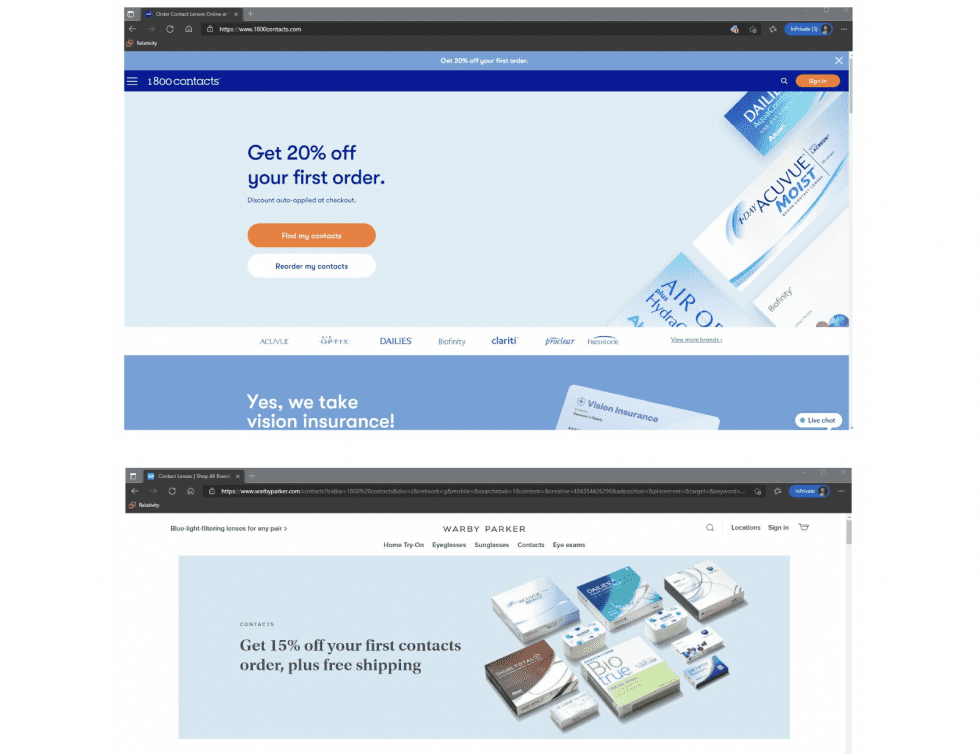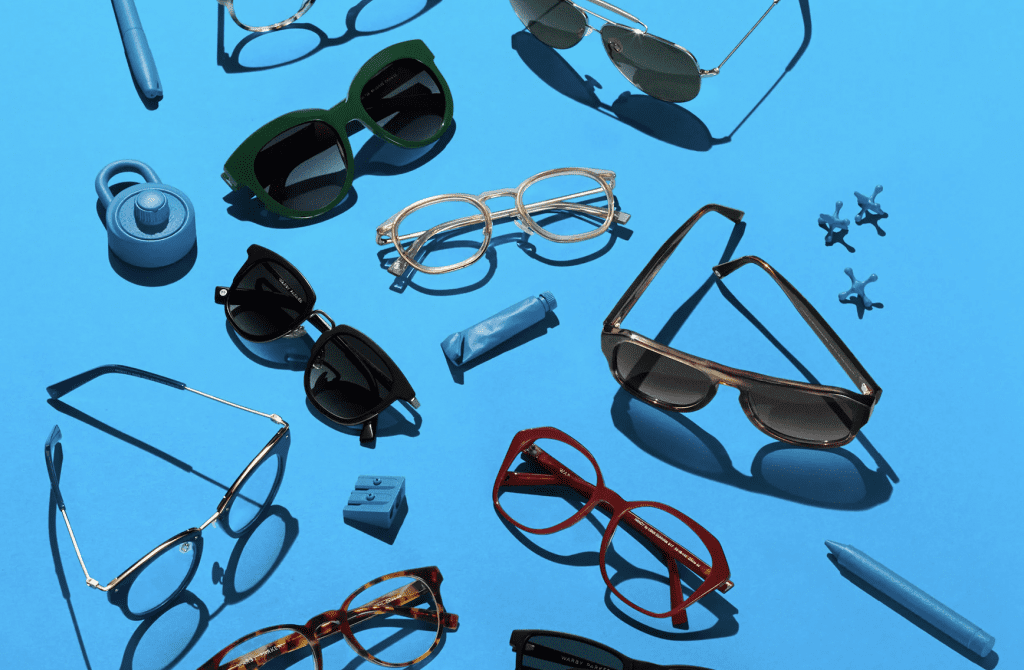Warby Parker has beaten a lawsuit accusing it of attempting to confuse consumers into believing that its products are affiliated with those of 1-800 Contacts by adopting a website that allegedly “mimics the look and feel of 1800contacts.com” and bidding on 1-800 Contacts’ trademarks as search engine keywords to generate Warby Parker advertisements. Handing Warby Parker a win in the almost-year-old lawsuit, a New York federal court granted its motion for judgment on the pleadings, finding that 1-800 Contacts did not plausibly plead a claim for relief as to its claims for trademark infringement and unfair competition, namely, by failing to show that consumers are likely to be confused as to the nature of Warby Parker’s products.
In a June 27 opinion and order, Judge Kevin Castel of the U.S. District Court for the Sothern District of New York summarized the trademark infringement and unfair competition case that 1-800 Contacts lodged against its younger rival in August 2021, stating that as part of its marketing efforts, “Warby Parker bids on search engine keywords that include the 1-800 Contacts marks, such that the search engine keywords generate results pages with advertisements linking to Warby Parker’s own website at or near the top of the results page.” At the same time, 1-800 Contacts alleged that upon clicking on these Warby Parker ads, consumers are sent to Warby Parker’s landing page for contact lenses, which “deceptively and intentionally mimics the look and feel of 1-800 Contacts’ website.”
This includes “use of a confusingly similar color scheme, layout, and discount offering, along with imagery evoking the 1800contacts.com website,’ such as by using a ‘familiar light blue colored background displaying representative contact lens products and a discount offer, just like that found at 1800contacts.com.’”

In one of its latest in a larger number of lawsuits it has filed over the course of a couple of decades, 1-800 Contacts alleged that Warby Parker’s conduct “‘diverts a material number of customers who expected to be taken to 1-800 Contacts’ website’ to [its] own website, which they either ‘reasonably believe to be affiliated with 1-800 Contacts,’ or belatedly realize is not 1800contacts.com, resulting in the inflation of Warby Parker’s online contact lens sales and 1-800 Contacts’s advertising costs.’”
Against that background, Judge Castel states that the primary issue before the court is whether 1-800 Contacts has plausibly pled that Warby Parker’s use of the 1-800 Contacts marks – through search term advertising and use a particular (and allegedly similar) landing page on Warby Parker’s website – would likely confuse consumers about the origin or sponsorship of Warby Parker’s goods. Looking to the Polaroid factors, the court determined that 1-800 Contacts’ trademarks are “strong,” and there are “sufficient allegations” of bad faith on Warby Parker’s part as to its decision to provide a different version of its landing page for contact lenses for consumers searching for 1800contacts.com, according to the court, thereby, enabling 1-800 Contacts to meet two of the factors in the likelihood of confusion test.
Those factors, however, are insufficient to find for 1-800 Contacts, per Judge Castel, who stated that the parties’ marks are “too dissimilar for reasonably sophisticated internet consumers to be confused as to whether they have navigated to and are purchasing contacts from 1-800 Contacts instead of Warby Parker.” Not only are the marks different, the judge noted that Warby Parker’s name is “clearly displayed in both: the website addresses contained in search results for the 1-800 Contacts marks and [on] the Warby Parker website,” further lowering the risk of confusion.
Speaking of dissimilarity, the court also says that consumers are unlikely to be confused by Warby Parker’s website, which 1-800 Contacts argues mimics its own, as Warby Parker uses a different placement of its logo on the page than 1-800 Contacts does; the parties use different shades of blue; and as to Warby Parker’s discount offer, “not only is this unlikely to confuse online consumers who presumably and frequently see discount offers from all types of retailers, Warby Parker’s website not only offers an inferior percentage discount (15% as opposed to 1-800 Contacts’s 20%), but also displays it only once, compared to 1800contacts.com, which also displays its 20% discount offer in a separate banner at the top of the screen, even above its own 1-800 Contacts mark.”
(Warby Parker previously argued in response to the lawsuit that in addition to “mistakenly claim[ing] that the purchase of a competitor’s trademarks for keyword advertising may create liability for trademark infringement,” 1-800 Contacts lacks rights in the appearance of its website, in part, because “multiple companies selling contact lenses online use the color blue and/or the same general layout as referenced [by 1-800 Contacts] in connection with their online promotion, advertisement, and sale of contact lenses,” making it so that the design is not distinctive and has not acquired secondary meaning in the minds of consumers.)
Still yet, the “sophistication of consumers in the relevant market” factor does not weight in favor of 1-800 Contacts, according to the court, which held that the relevant consumers – namely, consumers “conducting internet searches in the year 2022” – would “likely be familiar with both the concept of paid search results and the significance of website address links.” This pool of consumers would be sophisticated enough to “review the contents of any website that they have navigated to before taking further action, such as making an online purchase and providing sensitive payment information.” And in the event that they click on an “Ad” search result (or any another site) without wanting to, the court states (citing a prevision opinion from the Second Circuit) that consumers online can “more readily get back on track than those in actual space” – by pressing the “back” button, which serves to “minimize the harm to the owner of the searched-for site from consumers becoming trapped in a competing site.”
Ultimately, the court states that reasonable consumers are not likely to be confused as to whether they are about to purchase contact lenses from 1-800 Contacts instead of Warby Parker in connection with the latter’s advertising and website, and thus, concludes that 1-800 Contacts has failed to plausibly plead a likelihood of consumer confusion in this lawsuit, granting Warby Parker’s motion for judgment on the pleadings and entering judgment in its favor.
Reflecting on the implications of the case in a post of his own, Santa Clara University School of Law’s Eric Goldman states that “the court’s final point – that consumers can easily use the back button and often do–strikes at the core deficiency of keyword ad lawsuits since the beginning.” And as long as consumers “do not actually believe that Warby Parker is 1-800 Contacts, any consumer engagement with Warby Parker is pro-consumer competitive behavior,” per Goldman, who says that this is “exactly why 1-800 Contacts has been trying to shut down [competitors] for two decades.” Having established the category of online contact lens sales, “1-800 Contacts wants to shut the door on price competition so it can maximize the ROI from its category-building investments,” and Goldman notes that “this regressive and anti-consumer approach got zero traction with this judge.”
The case is 1-800 Contacts, Inc. v. Jand, Inc. d/b/a Warby Parker, 1:21-cv-06966 (SDNY).














